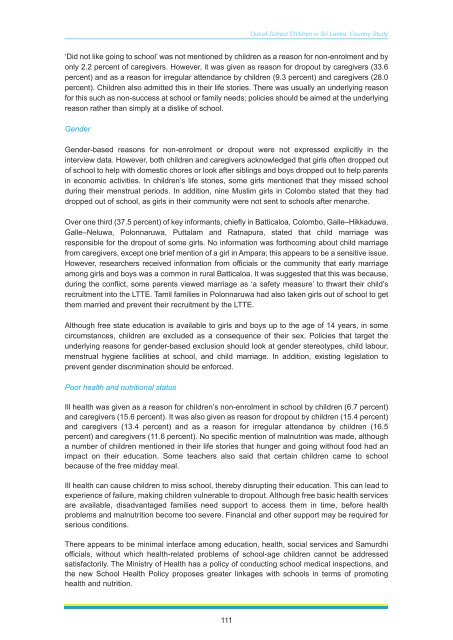Sri Lanka - Institut de statistique de l'Unesco
Sri Lanka - Institut de statistique de l'Unesco
Sri Lanka - Institut de statistique de l'Unesco
You also want an ePaper? Increase the reach of your titles
YUMPU automatically turns print PDFs into web optimized ePapers that Google loves.
Out-of-School Children in <strong>Sri</strong> <strong>Lanka</strong>: Country Study<br />
‘Did not like going to school’ was not mentioned by children as a reason for non-enrolment and by<br />
only 2.2 percent of caregivers. However, it was given as reason for dropout by caregivers (33.6<br />
percent) and as a reason for irregular attendance by children (9.3 percent) and caregivers (28.0<br />
percent). Children also admitted this in their life stories. There was usually an un<strong>de</strong>rlying reason<br />
for this such as non-success at school or family needs; policies should be aimed at the un<strong>de</strong>rlying<br />
reason rather than simply at a dislike of school.<br />
Gen<strong>de</strong>r<br />
Gen<strong>de</strong>r-based reasons for non-enrolment or dropout were not expressed explicitly in the<br />
interview data. However, both children and caregivers acknowledged that girls often dropped out<br />
of school to help with domestic chores or look after siblings and boys dropped out to help parents<br />
in economic activities. In children’s life stories, some girls mentioned that they missed school<br />
during their menstrual periods. In addition, nine Muslim girls in Colombo stated that they had<br />
dropped out of school, as girls in their community were not sent to schools after menarche.<br />
Over one third (37.5 percent) of key informants, chiefly in Batticaloa, Colombo, Galle–Hikkaduwa,<br />
Galle–Neluwa, Polonnaruwa, Puttalam and Ratnapura, stated that child marriage was<br />
responsible for the dropout of some girls. No information was forthcoming about child marriage<br />
from caregivers, except one brief mention of a girl in Ampara; this appears to be a sensitive issue.<br />
However, researchers received information from officials or the community that early marriage<br />
among girls and boys was a common in rural Batticaloa. It was suggested that this was because,<br />
during the conflict, some parents viewed marriage as ‘a safety measure’ to thwart their child’s<br />
recruitment into the LTTE. Tamil families in Polonnaruwa had also taken girls out of school to get<br />
them married and prevent their recruitment by the LTTE.<br />
Although free state education is available to girls and boys up to the age of 14 years, in some<br />
circumstances, children are exclu<strong>de</strong>d as a consequence of their sex. Policies that target the<br />
un<strong>de</strong>rlying reasons for gen<strong>de</strong>r-based exclusion should look at gen<strong>de</strong>r stereotypes, child labour,<br />
menstrual hygiene facilities at school, and child marriage. In addition, existing legislation to<br />
prevent gen<strong>de</strong>r discrimination should be enforced.<br />
Poor health and nutritional status<br />
Ill health was given as a reason for children’s non-enrolment in school by children (6.7 percent)<br />
and caregivers (15.6 percent). It was also given as reason for dropout by children (15.4 percent)<br />
and caregivers (13.4 percent) and as a reason for irregular attendance by children (16.5<br />
percent) and caregivers (11.6 percent). No specific mention of malnutrition was ma<strong>de</strong>, although<br />
a number of children mentioned in their life stories that hunger and going without food had an<br />
impact on their education. Some teachers also said that certain children came to school<br />
because of the free midday meal.<br />
Ill health can cause children to miss school, thereby disrupting their education. This can lead to<br />
experience of failure, making children vulnerable to dropout. Although free basic health services<br />
are available, disadvantaged families need support to access them in time, before health<br />
problems and malnutrition become too severe. Financial and other support may be required for<br />
serious conditions.<br />
There appears to be minimal interface among education, health, social services and Samurdhi<br />
officials, without which health-related problems of school-age children cannot be addressed<br />
satisfactorily. The Ministry of Health has a policy of conducting school medical inspections, and<br />
the new School Health Policy proposes greater linkages with schools in terms of promoting<br />
health and nutrition.<br />
111

















